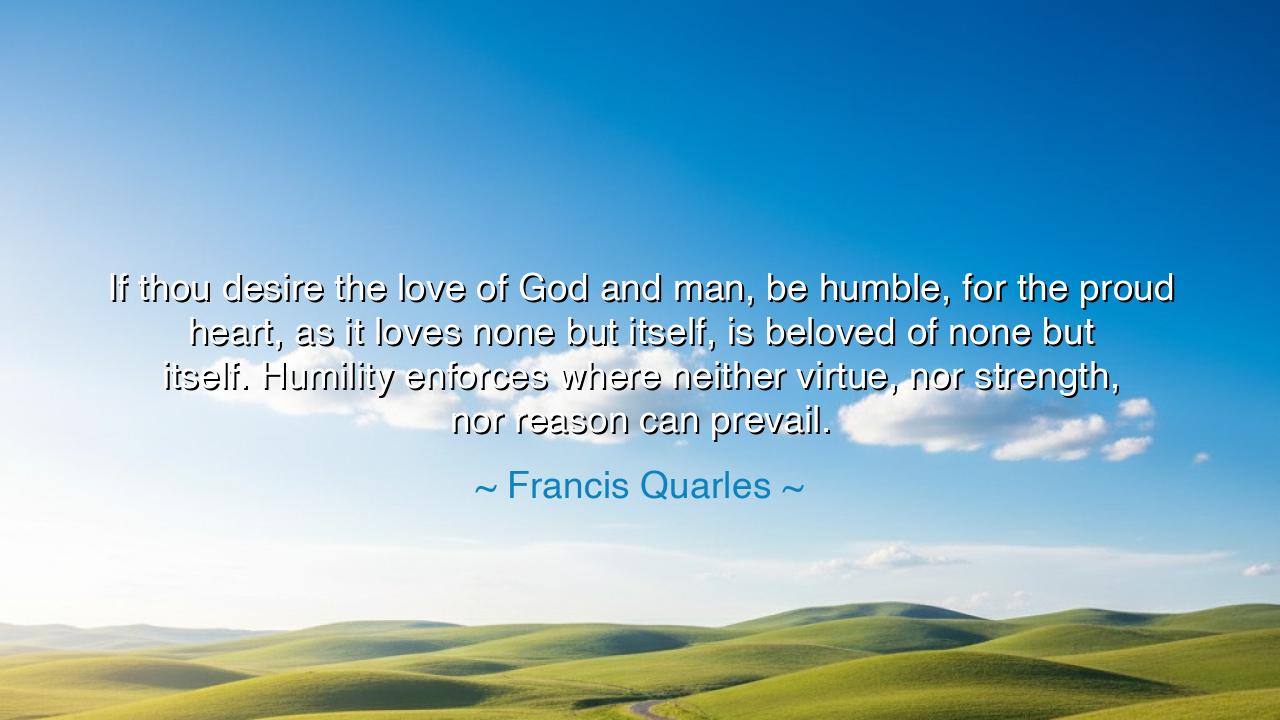
If thou desire the love of God and man, be humble, for the proud
If thou desire the love of God and man, be humble, for the proud heart, as it loves none but itself, is beloved of none but itself. Humility enforces where neither virtue, nor strength, nor reason can prevail.






"If thou desire the love of God and man, be humble, for the proud heart, as it loves none but itself, is beloved of none but itself. Humility enforces where neither virtue, nor strength, nor reason can prevail." These profound words by Francis Quarles strike at the very essence of the human spirit, revealing the timeless truth that the path to true love — both from God and from man — is not paved with power, pride, or self-glorification, but with humility. In the ancient teachings, the wise have long understood that to be loved by others, and to be in communion with the Divine, one must first empty the self and bow before the greater truths that bind us all. Pride, which seeks to elevate itself above others, creates barriers that not only hinder true connection but also isolate the one who holds it in their heart.
The ancients spoke often of humility as the most virtuous of all virtues, a key to unlocking the wisdom of the cosmos. The great philosopher Socrates once said, "The only true wisdom is in knowing you know nothing." This statement is not a mere dismissal of knowledge, but a humble acknowledgment of the limits of human understanding. Socrates knew that to truly approach wisdom, one must first empty the ego and open oneself to the lessons the world has to offer. In the humility of recognizing one's own ignorance, the heart is freed from pride and is open to learning from others and from the Divine. Humility is the gateway to wisdom, and through it, one can access not only understanding but love as well.
Consider, too, the story of Alexander the Great, a conqueror whose pride and ambition led him to the corners of the earth. Yet, in his later years, he was known to wrestle with the emptiness of his achievements. Despite all his power, all his conquests, and all his glory, Alexander found that pride had only alienated him from the people who might have truly loved him. Humility, had he embraced it, would have opened his heart to deeper connections with both his men and the divine forces he claimed to understand but never truly honored. In the end, it is not power or pride that binds people to one’s heart, but the humility with which one lives their life. Alexander’s story stands as a cautionary tale — that pride leads to isolation, while humility brings the possibility of true love and lasting peace.
The humble heart, as Quarles teaches, is not weak or subjugated, but rather possesses a quiet strength that virtue alone cannot summon. Humility has a power all its own, one that influences and enforces where brute force and clever arguments fail. Think of Jesus Christ, whose life was the epitome of humility. Born in a stable, living in simplicity, and serving others without expectation, His humility was the very source of His greatness. His message, not one of grandeur but of servanthood, changed the course of history. Humility, in His example, became the greatest of virtues, capable of transforming hearts and elevating souls beyond the confines of earthly power.
The lesson Quarles imparts is that true love, both from God and from mankind, is not to be sought by elevating oneself above others, but by descending in the spirit of service. As we see in the stories of the great teachers and sages, the ones who are most beloved by the Divine and by others are those who do not seek to dominate, but to serve. Humility, therefore, is not merely an internal disposition; it is an external force that draws others toward us. It is the unspoken bond that unites people in compassion and mutual respect. Humility has the power to mend broken relationships, heal hearts, and create communities rooted in true love.
In our own lives, we must seek to practice humility in both our actions and our thoughts. When we approach others with humility, we open the doors to deeper understanding, deeper love, and greater peace. It is in acknowledging our limitations, our flaws, and our dependence on others that we come to see the beauty of the world and the Divine presence within it. The proud heart, which demands to be seen and revered, isolates itself from the very things it desires most: connection, love, and grace. But the humble heart, willing to listen, to serve, and to give, becomes a beacon of light in a world too often clouded by selfishness and pride.
Therefore, let us take Quarles' teaching to heart: seek love through humility, not through force or pride. In every moment, let us remind ourselves that we are not here to elevate ourselves but to serve others and honor the Divine within all. Through this, we align ourselves with the timeless wisdom of the ancients, who understood that the greatest strength lies not in dominance but in humble service. And in this humble service, we will find the love of God, the love of man, and the peace that comes from living in harmony with the greater forces of the universe.






AAdministratorAdministrator
Welcome, honored guests. Please leave a comment, we will respond soon